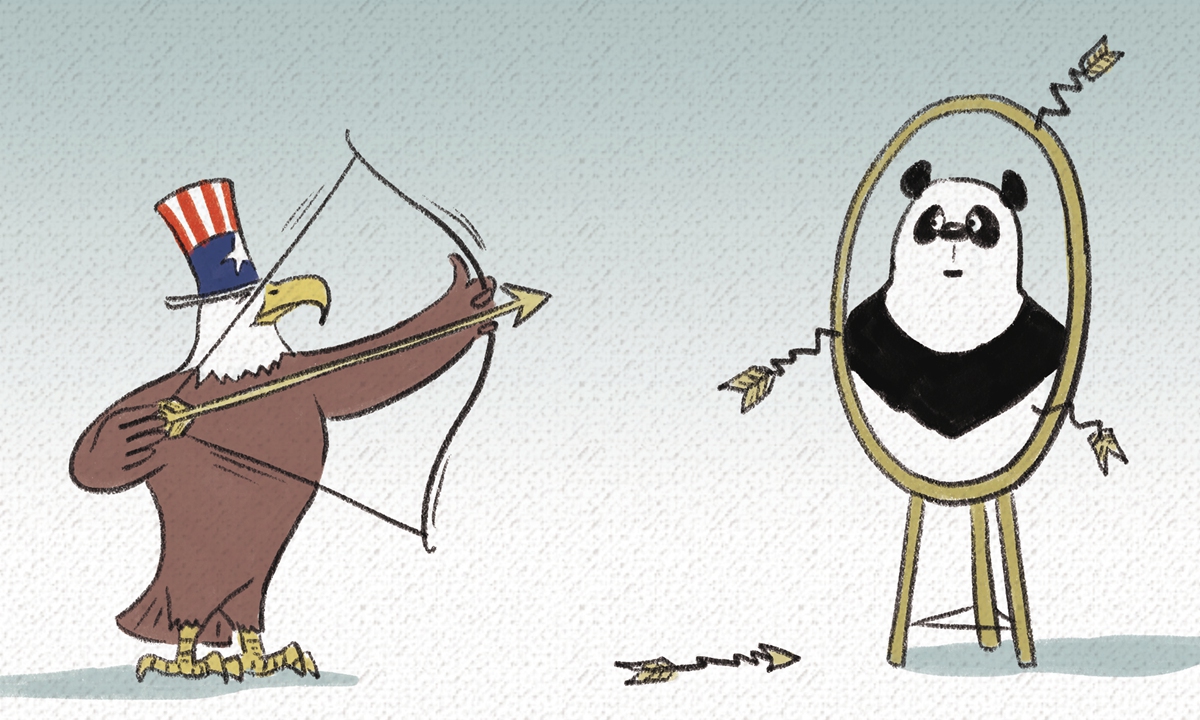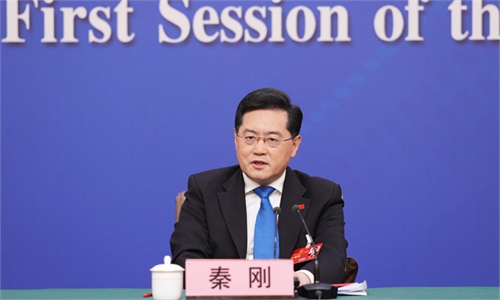Arouse vigilance, opposition around the world against ‘wolves’: Global Times editorial

Illustration: Liu Rui/GT
First, let's take a look at the headlines of several US media articles in recent days: The Wall Street Journal - "U.S., China Plunge Further Into a Spiral of Hostility;" The Washington Post - "The U.S.-China rift is only growing wider;" and The Washington Times - "We've entered a new Cold War with China." These are these media outlets' latest interpretations of China-US relations. Although their perspectives and positions are different, we can feel the tense atmosphere.These headlines have indirectly confirmed the warning issued by Chinese Foreign Minister Qin Gang on Tuesday: "If the US does not hit the brake but continues to speed down the wrong path, no amount of guardrails can prevent derailing, and there will surely be conflict and confrontation." In our Wednesday editorial, we noted that some US media are trying to label Chinese diplomacy and portray China as the one responsible for escalating tensions in China-US relations. Who exactly is hurting the bilateral ties and even world peace by showing its sharp claws? In order to avoid having a misperception, we need to answer this question correctly.
We have noticed that many US media outlets have mentioned the "signs of easing in China-US tensions" that emerged in the China-US relationship just a few weeks ago and have used this to indicate the fragility of the world's most important bilateral relationship. So what has caused China-US relations to become tense again? Is it because China's telling the truth? Clearly not. It is the Pentagon's sending of a sidewinder missile to an altitude of 20,000 meters, as well as the appearance of the F-22 fighter aircraft, like a group performance, that has turned an accidental incident caused by irresistible forces into a diplomatic crisis. The US side's distorted mentality toward China is the main culprit for undermining the China-US relationship.
Some in the US are eager to criticize China, even when China just speaks the truth. This itself is part of the fangs of the "wolf." In recent years, the US' containment and suppression of China in politics, economy, technology, culture, and other fields all conform to the behavioral characteristics of a "wolf." Some anti-China politicians in Washington who are constantly targeting and attacking China are a vivid portrayal of the "wolf" image.
In recent years, the US has not only launched a trade war against China, but has also implemented technology sanctions and sought "decoupling," and the US Congress has constantly introduced anti-China bills aimed at containing and suppressing China. The Biden administration claims it "does not seek conflict" but, in reality, continues to supply weapons to the island of Taiwan and conduct frequent close-in reconnaissance at China's doorstep. At the same time, the US is also trying hard to push for the Asia-Pacificization of NATO, forming a "wolf pack" led by the top wolf. Even the US ambassador to China has repeatedly provoked the China-US relationship publicly and on social media since taking office. This is the truth behind Washington's so-called "managing the competition responsibly" and "not seeking conflict."
The US is a country that places great emphasis on the right to self-defense, and the "stand your ground" laws implemented in most states give citizens a great deal of autonomy to defend themselves against threats, even using lethal weapons. However, in international relations, Washington clearly presents a different face. When it relentlessly presses China like a hungry wolf with an insatiable appetite for geopolitics, China will be portrayed as the "No.1 threat" if it picks up weapons for self-defense, and the US will constantly elevate its offensive posture. But where exactly has China "threatened" the US? We are afraid that many Americans have no answer to that. For many Washington elites, China's development and the Chinese people's desire for a better life are a kind of "original sin," because, in Washington's memory, wealth is accumulated through plunder and slaughter.
One noteworthy detail is that this year's Government Work Report continues to focus on domestic development and does not mention the US at all. In fact, this is basically the same case with similar reports in the past. In contrast, the US State of the Union Address in recent years mentions China every year. This clearly reflects the fundamentally different development approaches of the two countries: China does not rely on war, colonization, or plunder but has developed its own path to Chinese modernization, while it seems that Washington cannot find the "motivation" for its own development without creating conflicts with other countries. In other words, China's development relies on its own hard work and wisdom, while Washington is still immersed in the old hegemonic, domineering and bullying dream.
In response to Qin's remarks, the White House stated later on Tuesday that the US is seeking competition and "We do not seek conflict, and we do not want conflict." This is the often-used rhetoric by the US side, and it cannot be said that they are lying, as conflict is certainly not beneficial to anyone. However, Washington hopes China will not respond in words or action when slandered or attacked; how can this be possible? An article in a US media outlet quoted a former US senior official as saying, "The more resolutely and unapologetically we take steps to defend our national security, the more that boundaries will be respected." When such media said this, even if they had a tiny bit of empathy, China-US relations would not have been so damaged by them, and world peace and development would have been less threatened.

